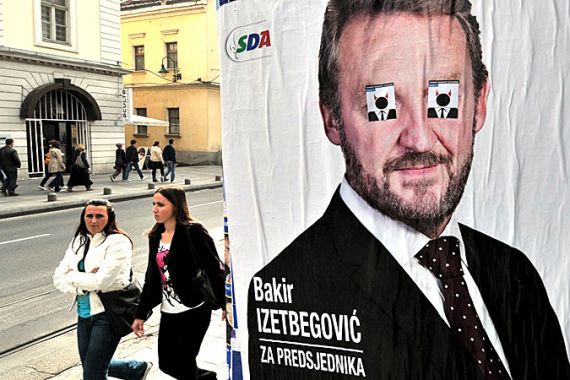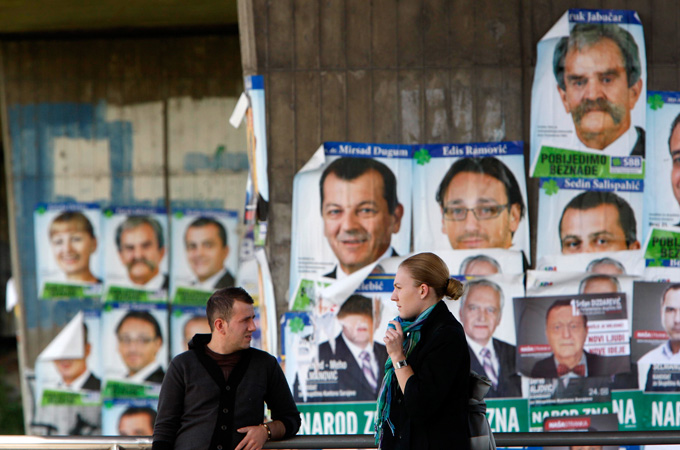Bosnia faces deadlock over future
Tripartite presidency set to be deadlocked with two leaders backing unity and third seeking country’s breakup.

 |
| The election has been described as possibly the most crucial vote since the civil war ended 15 years ago [AFP] |
The son of Bosnia-Herzegovina’s wartime leader looks set to take the Muslim seat in the country’s three-person presidency following elections over the weekend.
Bakir Izetbegovic held 34.6 per cent of the vote on Monday with 82 per cent of the ballots counted, the electoral commission said.
The son of Alija Izetbegovic, the revered Muslim wartime leader, has been seen as more prepared to work with other ethnic groups than incumbent Haris Silajdzic, saying he would “pursue realistic politics and reach out and co-operate”.
But preliminary election results indicate that the tripartite is likely to remain deadlocked over Bosnia’s future, with two leaders of the ethnically divided country advocating unity and a third pushing for the country’s breakup.
Rotating presidency
Zeljko Komsic, an incumbent for the country’s Croat seat who looks set to win again is a strong fighter for a unified, multiethnic Bosnia.
But Nebojsa Radmanovic, the Serb incumbent of the Alliance of Independent Social Democrats, backs the idea of Bosnian Serb secession from the rest of the country.
Milorad Dodik, the Republika Srpska prime minister, has also called for greater independence.
“Only the Serb Republic is self-sustaining, Bosnia-Herzegovina is not,” he told a pre-election rally.
Under the Bosnian constitution, the country’s presidency consists of one member from each of the country’s ethnic groups – a Bosniak and Croat elected from the Musilm-Croat Federation and a Serb from the Republika Srpska.
The members of the presidency serve a four-year term together. Initially, the member who receives the most votes is chairman, and subsequently, the chairmanship rotates every eight months.
Bosnia has held five elections since the 1992-95 war which killed about 100,000 people, but has lagged in political and economic reforms and remains near the back of the queue of Western Balkan nations aspiring to EU and NATO entry.
Sunday’s poll is being seen as the most crucial vote since the civil war, but much of the campaigning focused on ethnic divisions.
Voter frustration
Muslims, Croats and Serbs remain entrenched in their own communities, and mistrust between the country’s two semi-independent entities has widened.
Andrew Simmons, Al Jazeera’s reporter in Sarajevo, the Bosnian capital, said the election has revealed disillusionment with the system.
“What we have heard is an electoral official saying she is alarmed by 98,000 ballot papers being spoiled, about half of those were in the Republika Srpska, and the other in the Federation.
“It’s being read as a frustration amongst voters – spoiling ballot papers as a form of protest
However the preliminary turnout figure for the vote was 56.3 per cent, compared with 55.3 per cent in 2006.
“[The election] is the sign of maturity and a good sign for democracy in this country,” said Valentin Inzko, the international envoy who holds protectorate powers in Bosnia.
“I hope this will bring about the changes in this country, because if there are no changes the elections are not necessary,” said Inzko, an Austrian diplomat.
More than 1,200 observers, including 485 international observers, were registered to monitor the vote.